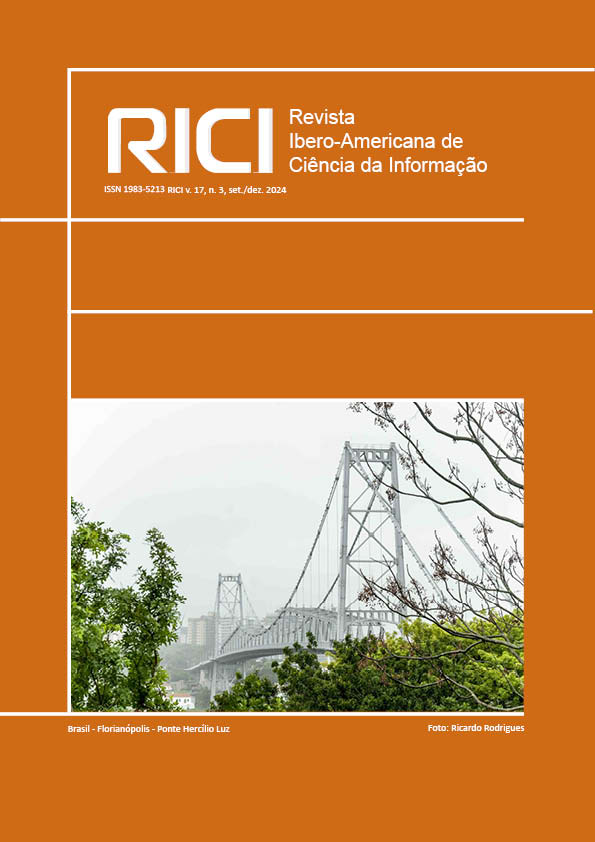National Bibliography Web-based: potential technologies for bibliographic heritage diffusion
Keywords:
Applicable digital technologies, Bibliographic heritage diffusion, National bibliography, Bibliographic heritageAbstract
This paper exams potential technologies to improve Current National Bibliography. It is based on perspectives about diffusion of national bibliographic heritage and actual IFLA guidelines for national bibliography, it aims to analyze three categories of applicable technologies: participatory, collaborative, and disruptive technologies. From the literature review, it explains that with the expansion of information and communication technologies, National Bibliographic Agencies can integrate technological resources within Web Information System Architecture and expand their activities to improve their national bibliographic work. It explains that the adoption of digital technologies may improve multimodal communication process in national bibliography architecture web-based. It concludes that digital technologies improve the communication of national bibliography Web-based with its users in a privileged way to provide access to the most diverse national bibliographic resources by participating, innovating and collaborating to national bibliography use and bibliographic heritage diffusion.
References
ALENTEJO, E.; GOTTSCHALG-DUQUE, C. Contributions from Multimodality for a Customer Service Support. In: INTERNATIONAL CONFERENCE ON QUALITATIVE AND QUANTITATIVE METHODS IN LIBRARIES, 4th, 2012, Limerik. Proceedings… Limerik: ISAST, p. 132 - 133.
ALENTEJO, E.; RAMANAN, T. National Bibliography in Brazil and Sri Lanka in Electronic Age: a comparative study. QQML Journal, [S. l.], v. 6, p. 217-227, 2017.
BEAUDIQUEZ, M. National Bibliographic Services at the Dawn of the 21st Century. Paris: IFLA, 1998.
BEAUDIQUEZ, M. Uses and usefulness of national bibliographies : which perspectives? Boston: IFLA, 2001.
BEIRA, E. J. C. Inovação e concorrência em serviços de informação académica. Encontros Bibli, Florianópolis, n. 2, p. 132–163, 2010.
BIBLIOTECA NACIONAL. Catálogos. Rio de Janeiro, 2024. Disponível em: http://bndigital.bn.gov.br/. Acesso em: 4 ago. 2024.
BOWER, J. L.; CHRISTENSEN, C. M. Disruptive Technologies. Harvard Business Review, [S. l.], v. 73, n. 1, p. 43-53, 1995.
BROOKES, B. C.. Jesse Shera and the Theory of Bibliography. Journal of Librarianship, London, v. 5, n. 4, p. 233-245, 1974.
BUCKLAND, M. Bibliographic access reconsidered. In: Redesigning library services: a manifesto. Chicago: American Library Association, p. 24-41, 1992.
CAMBRIDGE DIGITAL LIBRARY. Introducing the Cambridge Digital Library. Cambridge, University of Cambridge, 2024. Disponível em: https://cudl.lib.cam.ac.uk/about/. Acesso em: 2 ago. 2024.
CAVALCANTI, M.; NEPOMUCENO, C. O conhecimento em rede. Rio de Janeiro: Elsevier, 2007.
CHOWDHURY, G. From digital libraries to digital preservation research. Journal of Documentation, [S. l.], v. 66, n. 2, p. 207-223, 2010.
CTI. Types of Collaboration Technology. CIT, 2019. Disponível em: https://consoltech.com/blog/types-of-collaboration-technology/. Acesso em: 3 abr. 2024.
FORMAGGIO, E. Inteligência coletiva. Baguete Diário. São Paulo, 2011. Disponível em: https://www.baguete.com.br/artigos/943/erick-formaggio/14/02/2011/inteligencia-coletiva
HIRSH, S.; ALMAN, S. Blockchain. Chicago: ALA Center for the Future of Libraries, 2020.
HOEBEN, N. Qu’est-ce qu’un architecte de l’information? Bulletin des bibliothèques de France, Paris, n. 3, p. 93-94, 2012.
IFLA. Guidelines for National Bibliographies in the Electronic Age. Paris: IFLA, 2008. Disponível em: http://www.ifla.org/node/5226. Acesso em: 8 ago. 2024.
IFLA. Manifesto for Digital Libraries. Paris, IFLA/UNESCO, 2011. Disponível em: http://www.ifla.org/digital-libraries/manifesto. Acesso em: 3 ago. 2024.
THE INFORMATION ARCHITECTURE INSTITUTE. What is Information Architecture? [S.l.], 2018. Disponível em: https://www.iainstitute.org/what-is-ia. Acesso em: 2 jul. 2024.
KRAEMER, F. L.; SCHWERTNER, S. F. O fórum de discussão como um espaço para a inteligência coletiva. Hypertextus, São Paulo, v. 15, 2016. Disponível em: http://www.hipertextus.net/volume15/vol15artigo01.pdf. Acesso em: 3 ago. 2024.
LANKES, R.; SILVERSTEIN, J.;SCOTT, N.; MARSHALL, T. Participatory networks: the library as conversation. Information Research, London, v. 12, n. 4, p. 1-8, 2007. Disponível em: http://www.informationr.net/ir/12-4/colis05.html. Acesso em: 6 ago. 2024.
MORVILLE, P.; ROSENFELD, L. Information Architecture. Sebastopol, CA, O’Reilly Media, 2006.
OECD. Participative Web and User-created Content. Davenrs: OECD Secretary-General, 2007.
PONTIFÍCIA UNIVERSIDADE CATÓLICA DO RIO DE JANEIRO (PUC-RIO). Divisão de Bibliotecas e Documentação. Rio de Janeiro, Seção de Atendimento e Pesquisa, 2024. Disponível em: http://www.dbd.puc-rio.br/chatfuel/manual_bia.html. Acesso em: 2 ago. 2024.
SAYÃO, L. F. Bibliotecas digitais e suas utopias. Ponto de Acesso, Salvador, v. 2, n. 2, p. 2-36, 2008.
SCOTT, M. Preface. In: Larivière, J. Guidelines for Legal Deposit Legislation. Paris, UNESCO, 2000.
SEGARAN, T. Programming Collective Intelligence. Sebastopol: O’Reilly Media, 2007.
SMITH, H.; MCKEEN, J. Enabling Collaboration with IT. Communication of the Association for Information Systems, [S. l.], v. 3, n. 3, 16, 2011.
Downloads
Published
Issue
Section
License
Copyright (c) 2024 Eduardo Silva Alentejo

This work is licensed under a Creative Commons Attribution 4.0 International License.
Copyright Notice
Authors who publish in this journal agree to the following terms:
- Authors retain copyright and grant the journal right of first publication with the work simultaneously licensed under the Creative Commons Attribution License 4.0, allowing the sharing of work and recognition of the work of authorship and initial publication in this journal.
- Authors are able to take on additional contracts separately, non-exclusive distribution of the version of the paper published in this journal (ex.: distribute to an institutional repository or publish as a book), with an acknowledgment of its initial publication in this journal.
- Authors are permitted and encouraged to distribute their work online (eg.: in institutional repositories or on their website) at any point before or during the editorial process, as it can lead to productive exchanges, as well as increase the impact and citation the published work.
















